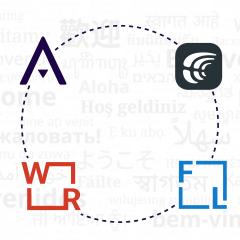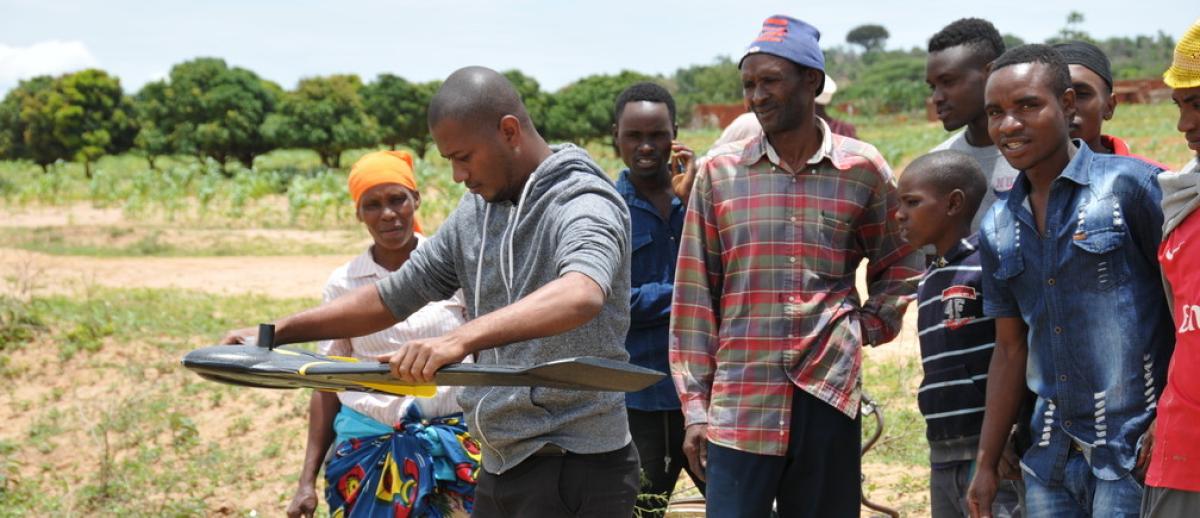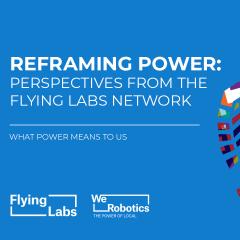
Rethinking the 4th Industrial Revolution: WeRobotics at the World Economic Forum
October 23rd, 2018

Should we wait for the industry to invest in emerging markets knowing they have fragmented economies that are difficult to grow and local needs that global solutions cannot meet?
This is perhaps the real question behind our reason to exist and one that we tried to answer at the 12th World Economic Forum’s Annual Meeting of New Champions held on September 18-20, 2018 in Tianjin, China. As a panelist for the “Drones, Delivery and Data” session, our co-founder Sonja Betschart shed some light on how we addressing local needs with locally run and managed drone applications.
Local Needs Require Local Solutions
Five years in, drone technology is constantly improving and readily available. Yet, adoption is slow and integration difficult to implement. In low-income countries where often high-resolution and timely aerial data is not accessible, drones are potentially one of the most useful tools to produce geospatial data and make information available to improve livelihoods, from disaster management to sustainable agriculture.
Where local communities have specific local needs to solve, such as pre-harvest loss in African smallholder farms or reconstruction efforts after landslides in Nepal, drones are an efficient solution that can be deployed quickly. Local needs, however, are not something global stakeholders such as NGOs, governments and manufacturers can easily solve, making it difficult to invest in and manage solutions at a community level.
While wealthy nations keep being privileged with easy access to tech, data and knowledge, we take a bottom-up approach in the Global South to build local capacity, train young local professionals to become drone experts, educate them on the ethical use of drones and AI, and get them to participate in the global economy.

Bridging the Digital Divide
In our article for the World Economic Forum “How robotics can help humanitarians bridge the digital divide” we draw from the inequalities generated in vulnerable economies by relentless technology innovation and place capacity building at the core of our mission.
In the specific case of humanitarian aid deployment and based on our own experience, while international organizations are already favourable to integrating drones to support their efforts, hiring local drone pilots in the global south is still not common practice. It is crucial that young professionals in these countries learn marketable skills that can be used by international humanitarian organizations such as the United Nations or the World Bank for local crisis management.
If education is key to drive change, regulation is of utmost importance to generate trust around new technologies.
Integrating Technical and Social Needs within Regulations
Whereas drone regulations are being tackled by policy-makers across the globe, we believe that it is critical to integrate human and ethical aspects on a case-by-case basis to more general technical requirements prescribed by a particular administration. In line with our localized “bottom-up” approach, our Code of Conduct has been developed to take into consideration culture, traditions and customs linked to specific regions in which to operate a drone.
In 2015, the importance of a drone Code of Conduct in the social sector became evident during rescuing operations in the then earthquake-hit Nepal, where the spontaneous use of drone technology just added to the already chaotic situation. On the one hand, the benefits of aerial platform triggered the interest of the majority of the humanitarian organizations involved; on the other hand, the lack of knowledge, from flight to data management and analysis and interpretation still constitutes a barrier.
In the panel discussion “Governance by Design”, Sonja acted as a Design Thinking Facilitator, stimulating discussions on the challenge Flying Labs face between local needs and local regulations - two elements that are often not yet fully aligned.
Emerging Technologies As Social Processes
On September 25, 2018, on the occasion of the World Economic Forum’s Sustainable Development Impact Summit held in New York, our co-founder Andrew Schroeder talked about the role of WeRobotics in the 4th Industrial Revolution - perhaps a more theoretical conceptualization than a proven fact. Where technology itself figures as the prime actor, we focus on the central roles of human and community agency, enhanced and accelerated by the power of emerging robotics and analytics technologies.
What became apparent was that emerging technologies need to be rethought as social processes, not as causes or drivers of change themselves. According to Andrew, we have an ongoing need to embed emerging technologies in strong ethical frameworks which contribute to building more equitable dynamic societies.
If we want those social processes to benefit all people we need not to wait around for technological solutions but to actively create the institutions, collaborations and technological applications that may bring about that more equitable future.
Enormous opportunities are opening up to solve some of the world’s most intractable problems using the combined power of community-based technological creativity. If we can make a difference, the rewards will be profound.
Recent Articles

